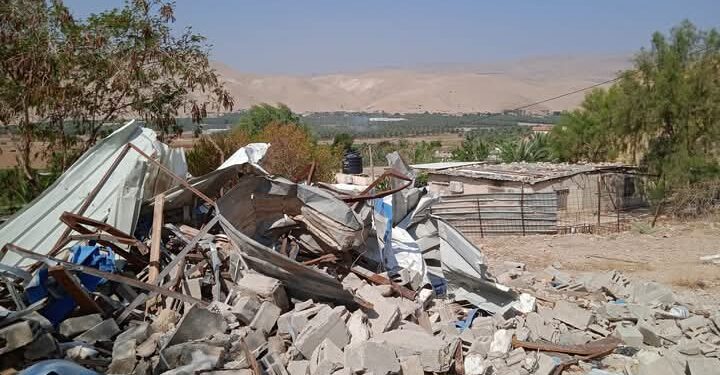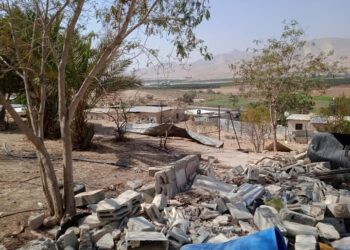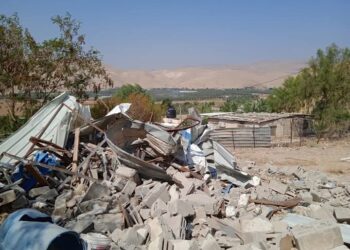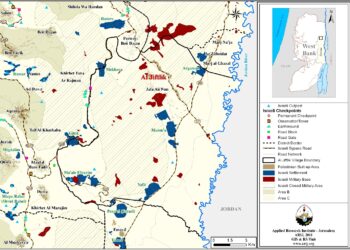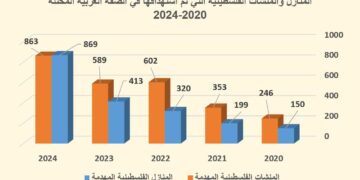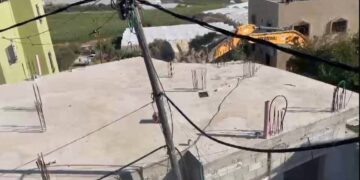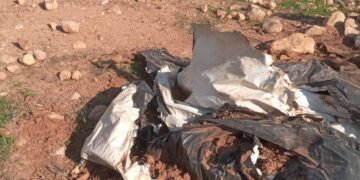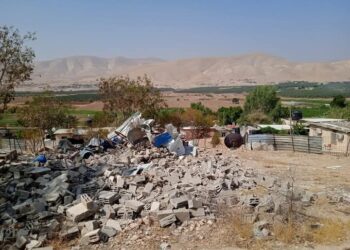 The Israeli occupation forces stormed the village of Al-Jiftlik, north of Jericho, accompanied by military bulldozers and specialized teams, with the aim to forcibly evict and consequently demolish the Palestinian house of Abu Ubaila family. Some months prior to the demolition, the family were served with a notice to demolish their 120-square-meter house, which was built of bricks back in 2011. A family of 7 members resided the house (three males and four females) at the time the Israeli Army demolished it. A year earlier, the Israeli occupation Army raided the family’s house, destroyed a large part of it and vandalized its contents, which was a prelude to completely demolishing the house.
The Israeli occupation forces stormed the village of Al-Jiftlik, north of Jericho, accompanied by military bulldozers and specialized teams, with the aim to forcibly evict and consequently demolish the Palestinian house of Abu Ubaila family. Some months prior to the demolition, the family were served with a notice to demolish their 120-square-meter house, which was built of bricks back in 2011. A family of 7 members resided the house (three males and four females) at the time the Israeli Army demolished it. A year earlier, the Israeli occupation Army raided the family’s house, destroyed a large part of it and vandalized its contents, which was a prelude to completely demolishing the house.
The demolition was carried out under harsh conditions. The head of the family, the father, Mr. Ahmed Abu Ubaila, was at the time of the demolishing detained by the occupation forces, and the mother worked on a farm to provide for the family, and the children were all alone in the house, facing the trauma of witnessing their home as the brutality of the Israeli bulldozers destroyed their only shelter.
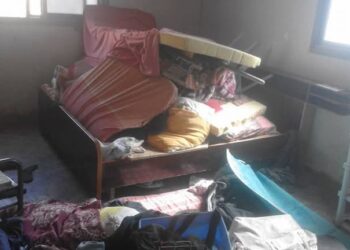
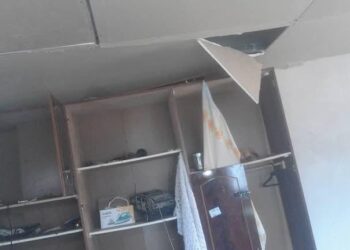
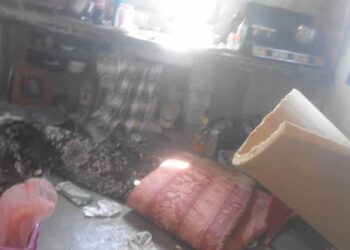
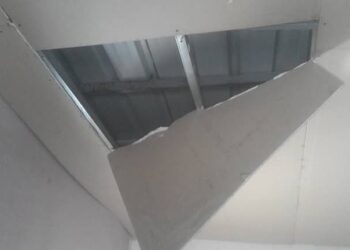 The Israeli army forces pushed their way into the house and forced the children to leave their home while they watched as soldiers removed their furniture and belongings and threw them out into the open. At the same time, other workers cut off the electricity to the house, in preparation for the demolition, which then took place in front of the children of the family.
The Israeli army forces pushed their way into the house and forced the children to leave their home while they watched as soldiers removed their furniture and belongings and threw them out into the open. At the same time, other workers cut off the electricity to the house, in preparation for the demolition, which then took place in front of the children of the family.
The occupation authorities claimed the typical pretext they almost usually use as the reason for the demolition of Palestinian homes in Area C: “building without a permit,” despite the difficulties Palestinians face in obtaining building permits in Area C due to discriminatory policies.
For some time, the Israeli army forces led a vicious campaign in the village of Al-Jiftlik, where they demolished four inhabited homes, each measuring between 120-150 square meters, and Palestinian families were similarly to Abu Ubaila family were displaced from their homes in the same way. Even more, all families face great difficulties in securing alternative shelter, due to the occupation’s prevention of construction in the area. The campaign in Al-Jiftlik did not end with the Abu Ubaila family. Four other houses, each measuring 120 to 150 square meters, were demolished, displacing several other Palestinian families.
In an evident display of double standards, settlers, under the pretext of settlement expansion, bulldozed approximately 100 Dunums of government land near the village cemetery with the intention of seizing and cultivating it, despite its official designation as government property.
Mrs. Dalia Abu Ubaila, Ahmed’s wife, described the immense challenges her family faces in securing alternative shelter. They are now crammed into her father-in-law’s small home, which was already insufficient for its original occupants. Adding seven more people has created overcrowding, and overly worsen the economic and social difficulties, the impact is particularly severe on the family’s four daughters and the lack of personal space restricts their freedom to study, move, and live comfortably. Mrs. Dalia emphasized that despite the coercing measures of the occupation against them to leave their land, her family remains determined to stay, and resist such discriminating policies, noting that they are aware the ban on construction is part of a systematic policy aimed at displacing Palestinians and imposing Israeli control over the area.
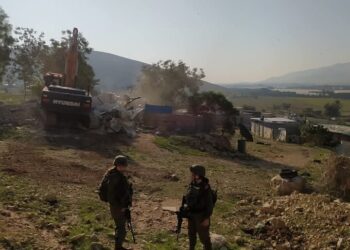
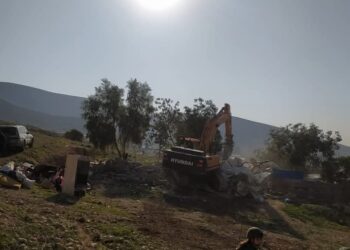 Palestinian officials have condemned the systematic demolition campaign in Al-Jiftlik, calling it a deliberate effort to displace Palestinians and tighten Israeli control over the area. They affirmed that such actions would only strengthen the resolve of the Palestinian residents to hold on to their land and defy the occupation’s discriminatory measures.
Palestinian officials have condemned the systematic demolition campaign in Al-Jiftlik, calling it a deliberate effort to displace Palestinians and tighten Israeli control over the area. They affirmed that such actions would only strengthen the resolve of the Palestinian residents to hold on to their land and defy the occupation’s discriminatory measures.
About Al-Jiftlik Village:
It is one of the villages located north of the Jericho Governorate. It is bordered to the east by the Jordan River, to the north by the village of Marj Al-Ghazal and the lands of the Tubas Governorate, to the west by the villages east of the Nablus Governorate, and to the south by the village of Fasayil. The residential area of Al-Jiftlik village covers an area of 972 Dunums, and is among the largest Palestinian villages in the Jordan Valley. It is home to approximately 4,000 residents, with a relatively equal gender distribution. According to the Oslo Accords classification, Al-Jiftlik is classified as Area C, which falls under full Israeli civil, administrative, and security control.
Prepared as part of the project:
“Mapping and Diagnosing Palestinian Rural Women’s Livelihood and Economic Empowerment in Area “C”
Implemented by: The Applied Research Institute-Jerusalem (ARIJ)
Prepared by:
The Applied Research Institute – Jerusalem


